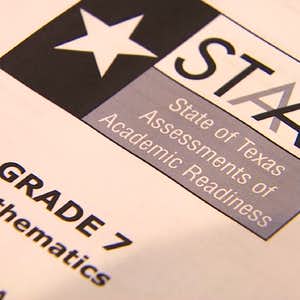The Army psychiatrist charged in the Fort Hood shooting rampage unexpectedly severed ties with his lead attorney Wednesday, eight months before the military trial at which he faces the death penalty.
Maj. Nidal Hasan confirmed during his arraignment that he dropped his civilian attorney, a retired Army colonel who had represented him since the 2009 attack on the Texas Army post.
Hasan, who is charged with 13 counts of premeditated murder and 32 counts of attempted premeditated murder, said he wanted to be represented by three military attorneys. Two were already on his defense team.
Asked whether his parting with his attorney was voluntary, Hasan told the judge, "Yes, it was."
John Galligan, the civilian attorney, was not in court. He told The Associated Press just before the hearing that he decided to step down temporarily but stood ready to "resume an active role." Galligan declined to give a reason for his decision.
Hasan did not enter a plea during the 15-minute arraignment, and it's unclear when he will. According to military law, he cannot plead guilty because it is a death penalty case.
Col. Gregory Gross, Fort Hood's chief circuit judge, set the military trial date for March, which the defense team had requested. Jurors will be brought in from Fort Sill, Okla., according to documents filed in the case.
Local
The latest news from around North Texas.
During the hearing, Gross told Hasan that death-penalty cases in the military require at least 12 jury members, more than in other cases. And unlike other trials, their verdict must be unanimous in finding guilt or assessing a sentence. If Hasan is convicted, jurors would decide between life in a military prison without parole and the death penalty.
Fort Hood's commander, Lt. Gen Donald Campbell, announced two weeks ago that Hasan would be tried in a military court and would face the death penalty. That decision echoed recommendations from two Army colonels who also reviewed the case.
Galligan vigorously defended Hasan long before Fort Hood's commander decided that he'd go to trial.
"I have consistently argued that Major Hasan has not been treated fairly. I maintain that belief," Galligan said Wednesday.
Hasan, 40, was paralyzed from the waist down after being shot by police the day of the rampage. He remains in the Bell County Jail, which houses defendants for nearby Fort Hood.
At an evidentiary hearing last fall, witnesses said that a gunman wearing an Army combat uniform shouted "Allahu Akbar!" -- which is Arabic for "God is great!" -- and opened fire in a small but crowded medical building where deploying soldiers are vaccinated and undergo other tests. The gunman fired rapidly, pausing only to reload, even shooting some people as they hid under tables or fled the building, witnesses said.
Some witnesses identified the gunman as Hasan, an American-born Muslim who was scheduled to deploy to Afghanistan the following month. Before the attack, Hasan bought a laser-equipped semiautomatic handgun and repeatedly visited a firing range, where he honed his skills by shooting at the heads on silhouette targets, witnesses testified during the hearing.
A Senate report released earlier this year said the FBI missed warning signs and that before the rampage, Hasan had become an Islamic extremist and a "ticking time bomb."



